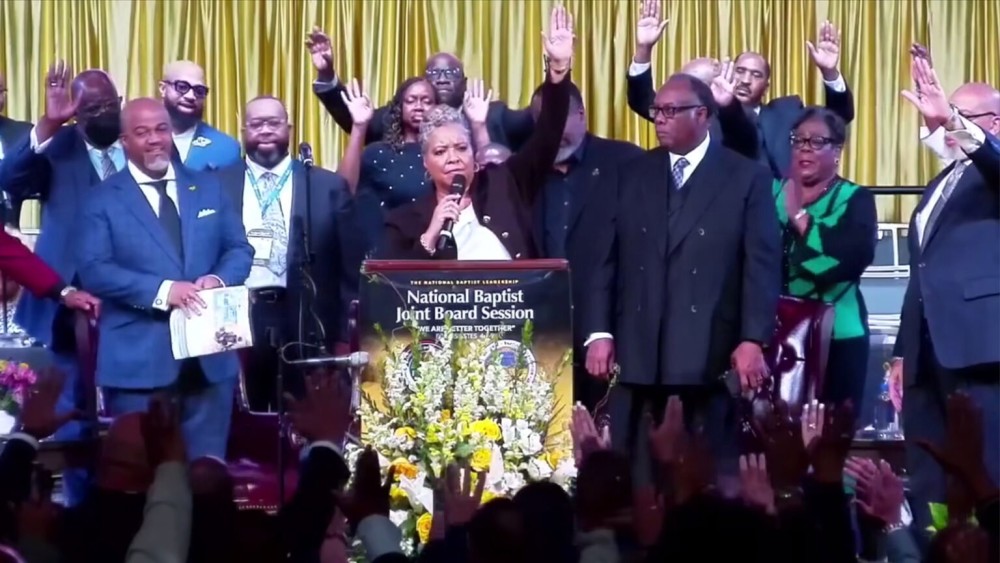Historic sermon by Gina Stewart at joint Black Baptist meeting draws cheers, controversy

Gina Stewart addresses the National Baptist Joint Board Session on January 23 in Memphis, Tennessee. (Video screengrab)
Gina Stewart has been known for breaking barriers in Black Baptist circles.
In 1995, she became pastor of Christ Missionary Baptist Church and the first African American woman to be elected to a Black Baptist congregation in Memphis, Tennessee. In 2021, she was elected president of the Lott Carey Baptist Foreign Mission Society, marking the first time a woman gained the highest post of a Black Baptist organization.
And in late January she became the first woman to preach at the periodic joint meeting of four Black Baptist denominations.
After many in the room cheered her on and stood as she preached, the session featuring her sermon temporarily disappeared from the Facebook page of the National Baptist Convention U.S.A. Inc. Some claimed there were attendees who chose not to be present when Stewart spoke.
To some, the interest in Stewart’s sermon and the criticism from those who chose not to attend it demonstrated either the long-standing autonomy of Baptist churches—some with women pastors—or the continuing resistance to acceptance of women in the pulpits of Black Baptist churches.
On Thursday morning the NBCUSA Facebook page included a post that said the morning service that featured Stewart’s sermon “has been maliciously removed from our page. The video was NOT removed by any of the administrators or the officers of the NBCUSAINC. We have reported the issue and are awaiting the results of the investigation.”
Jerlen Young-Canada, media and press relations director for NBCUSA, said in an interview that videos of the session featuring Stewart’s sermon, as well as other sessions, were aired live and then disappeared for reasons yet to be determined.
“No one on our National Baptist media team have removed videos,” she said.
In her sermon, Stewart spoke of the courage of Claudia, the wife of the Roman governor Pontius Pilate, who after having a dream, sent her husband a message to leave Jesus, an “innocent man,” alone.
Stewart described Jesus, who was ultimately crucified under Pilate, as someone who got in trouble for breaking traditions and caring for the marginalized.
“Jesus had a whole theological conversation with a woman at a well who was coming to look for water,” she preached, “and then commissioned this woman to go and run a revival in the city and the folks got saved. Jesus is in trouble. I said, he’s in trouble because he actively sought out and engaged with individuals who were often excluded by society.”
Some PNBC-affiliated clergy watched the sermon online from afar, and at least one, Otis Moss III of Chicago, incorporated some of it in his next Sunday sermon cautioning against, as Stewart put it, “using your spirituality as a smokescreen” instead of admitting to racism, sexism, or homophobia.
“It was masterful,” said Moss, senior pastor of Trinity United Church of Christ and a lifetime member of the PNBC. He said he was told “there were individuals who did not attend” it but he considers Stewart to be “one of the most gifted preachers of this generation—period.”
Bible scholar and retired professor Renita Weems said she’s witnessed past incidents of women being cheered and criticized when taking new steps in their established preaching careers. She cited the example of Bishop Yvette Flunder, a Black lesbian whom Weems and others invited to speak during an annual lecture series in 2015 at American Baptist College in Nashville, Tennessee.
Weems said not much has changed in almost a decade at the denominational level of Baptist life.
“The needle has not moved,” she said, “at all as it relates to sexism and gender discrimination in the Baptist church.”
Young-Canada, who has led a Jackson, Mississippi, church for 40 years that has never had women pastors, said the autonomy of the churches can be viewed as a strength and sometimes a weakness.
“The National Baptist Convention has no authority to instruct a particular local church as to how it will or will not deal with that issue,” he said. “It’s a local church issue.” —Religion News Service


